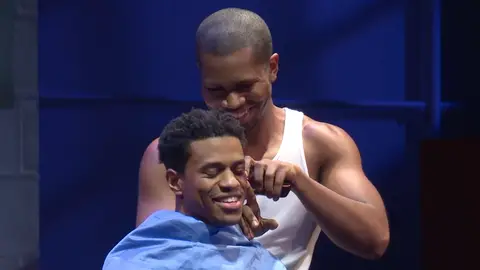“Choir Boy” Stars on How the Show Tackles Toxic Masculinity in the Black Community

Moonlight’s Oscar-winning screenwriter Tarell Alvin McCraney made his Broadway debut this month with Choir Boy. The powerful, coming-of-age show about a gay gospel choir leader named Pharus at an elite, black, all-male prep school has been garnering praise and attention—even Hillary and Bill Clinton attended opening night premiere.
NewNowNext caught up with two of the show's stars, Jonathan Burke (who will play Pharus beginning February 26) and Caleb Eberhardt (David), to talk about how the show addresses homophobia, religion, and toxic masculinity.
"The fact that he is a gay, black boy in America, that's me, that's how I grew up," says Burke reflecting on how he relates to Pharus. "So coming to terms with that as a young person and [navigating] the world in a culture that really promotes heavy masculinity—especially in the black culture—it's not easy."
Burke and Eberhardt also reflected on a particularly moving scene in Choir Boy that puts a spotlight on a place where toxic masculinity runs rampant—the barbershop.
"There's a scene where Pharus speaks about going to the barbershop as a child and how that was a traumatic, terrifying experience for him," says Burke. "For me, the barbershop is this prime example of hypermasculinity. Men are talking about sports, women...but I had to put on this mask and pretend to be a part of it or keep silent. It was a terrifying place to be."
Though he identifies as straight, Eberhardt also said the barbershop gave him the same feeling.
"I was put in situations that I wasn't ready for, but was forced into it, because that's how [other men behaved]," he says. "It was was something I started to think about as I got older."
The show, originally a limited engagement at the Manhattan Theatre Club, runs until March 10. Eberhardt says he hopes audiences—particularly members of the black community—learn a lesson about coming together.
"We're very fortunate to be part of a black ass play on Broadway, with a lot of beautiful, black men," he says. "I hope people take away that when we talk about the unity of black people, we can't afford to pick and choose which black people we want to unify with."
Watch the full interview below.





